 The OCZ RevoDrive Hybrid is new entry for OCZ in the growing caching storage segment. The main thrust of caching is to get SSD speeds over the span of a larger capacity hard drive. With the RevoDrive Hybrid, OCZ is attempting to accomplish this goal by delivering a single integrated solution of a 1TB hard drive, 100GB caching SSD and software from NVELO on a PCIe board that’s easy to install.
The OCZ RevoDrive Hybrid is new entry for OCZ in the growing caching storage segment. The main thrust of caching is to get SSD speeds over the span of a larger capacity hard drive. With the RevoDrive Hybrid, OCZ is attempting to accomplish this goal by delivering a single integrated solution of a 1TB hard drive, 100GB caching SSD and software from NVELO on a PCIe board that’s easy to install.
The OCZ RevoDrive Hybrid is new entry for OCZ in the growing caching storage segment. The main thrust of caching is to get SSD speeds over the span of a larger capacity hard drive. With the RevoDrive Hybrid, OCZ is attempting to accomplish this goal by delivering a single integrated solution of a 1TB hard drive, 100GB caching SSD and software from NVELO on a PCIe board that’s easy to install.
OCZ is the first to take this unique approach to caching, the single PCIe board solution with the SSD and hard drive embedded, truly is a novel solution. Being space constrained, OCZ opted for a 2.5" 1TB notebook hard drive, which gets piggybacked on the card. The SSD heavy lifting is handled via a pair of SandForce SF-2281 processors and 50% over provisioning for SSD longevity.
The net result is performance over the PCIe interface that is pretty astonishing, consdering the 1TB 5400 RPM drive that houses most of the data. With max read performance of 910 MB/s, writes of 810 MB/s and 120,000 IOPS, the RevoDrive Hybrid has a ton of potential for the workstation or enthusiast user. The RevoDrive Hybrid is available in a single configuration of 1TB hard drive and 100GB SSD cache (RVDHY-FH-1T) with an MSRP of $495.
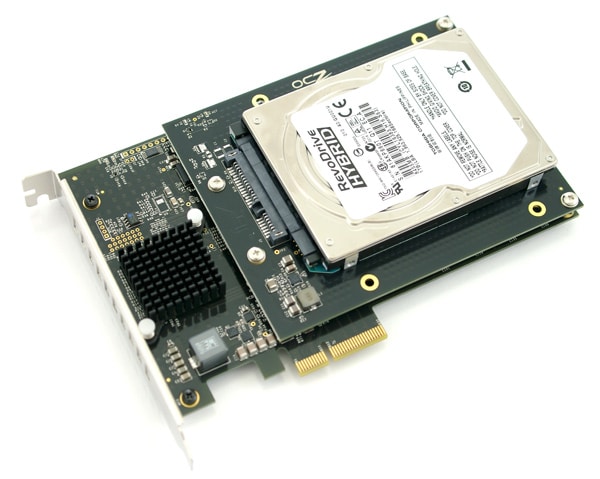
For background on this drive, see our First Thoughts Review here.
- Takes up two PCI-e slots due to height of attached hard drive
- PCI-e 2.0 (x4) interface
- 2x SandForce SF-2281 processors
- OCZ SuperScale storage controller
- Max. sequential read (SSD)/(AS-SSD): 910/810MB/s
- Max. sequential write (SSD)/(AS-SSD): 810/130MB/s
- Max. 4K random write (SSD)/(AS-SSD): 120,000/30,500 IOPS
- Average write IOPS (SSD)/(AS-SSD): 65,000/32,000 IOPS
- Hard drive RPM: 5400
- NAND components: 25nm MLC flash memory
- 3-year warranty
- Retail price: $495.00
Benchmarking a Tiered-Hierarchy Caching Solution
When it comes to benchmarking the OCZ RevoDrive Hybrid, it’s important to look past a lot of the initial complaints we as reviewers might have when testing a device such as this. While we might talk about it being difficult or unfeasible to use some of our testing tools with this hardware, this is only relevant to us in the context of performing the review, not the end-user experience. It is also important to realize that not all storage solutions are created equal and some of the methods used to benchmark drives or storage arrays needs to be adjusted depending on the product at hand.
The way we prefer to look at the RevoDrive Hybrid, as well as other large multi-tiered caching solutions, is how they would perform in the real world over the life of the product. This means factors like the first, second, or third load of an application is almost meaningless when you might open an application hundreds or thousands of times over the life of your computer. The Dataplex software also gives write-speeds a significant boost the first time around with write-back support, which helps reduce any pre-cached lag that might come during the first load of an application or game level. With a 100GB SSD paired to its 1TB HDD storage, almost all "hot" data would stay in the flash-storage without worrying about being bumped out like it might be in a drive like the Seagate Momentus XT with only 4GB of flash. For this reason we show how well the OCZ RevoDrive Hybrid performs when its performance levels off in each benchmark, since that is what the buyer would see in their computer from essentially the second day and beyond.
- SSD Only
- SSD/HDD Combo
- HDD Only
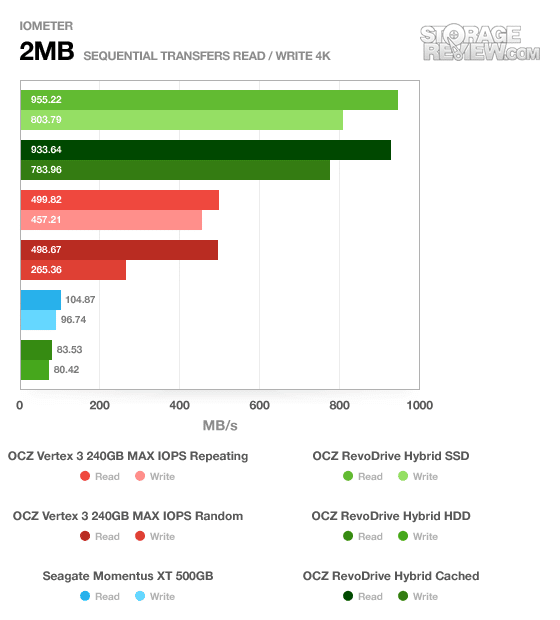
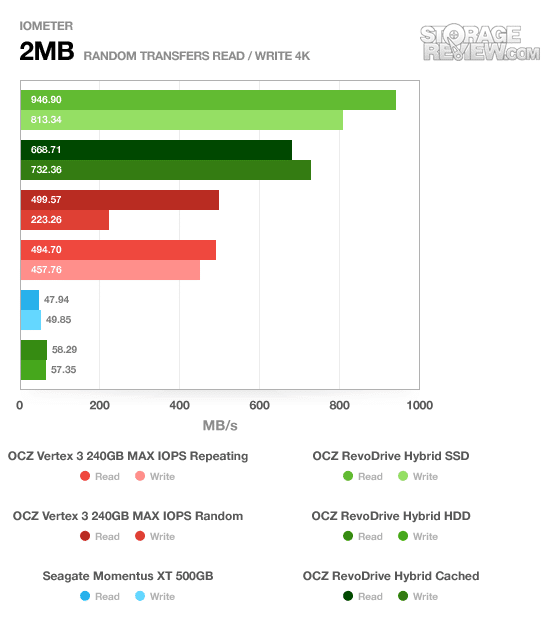
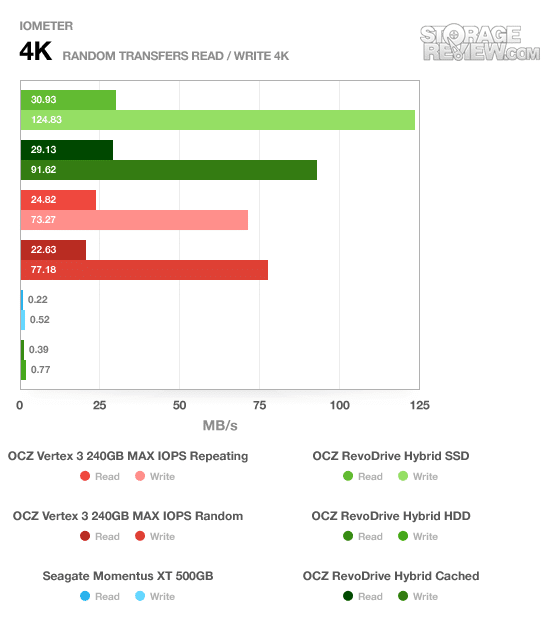
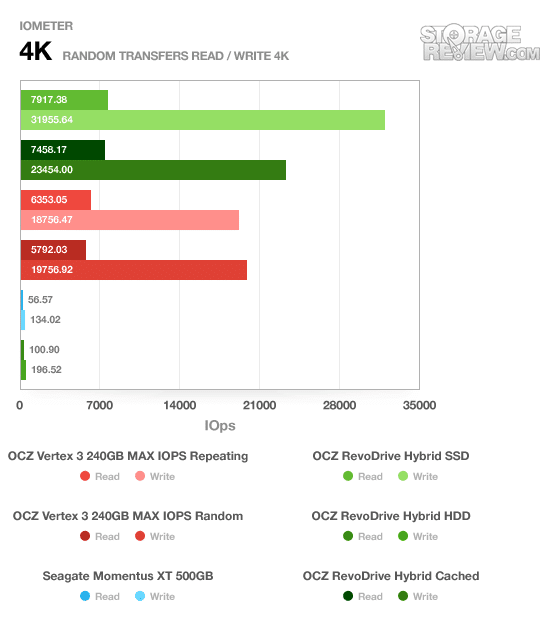
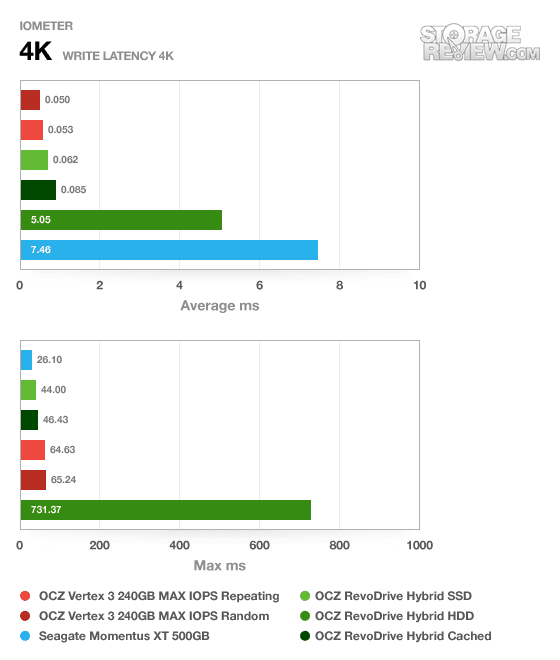
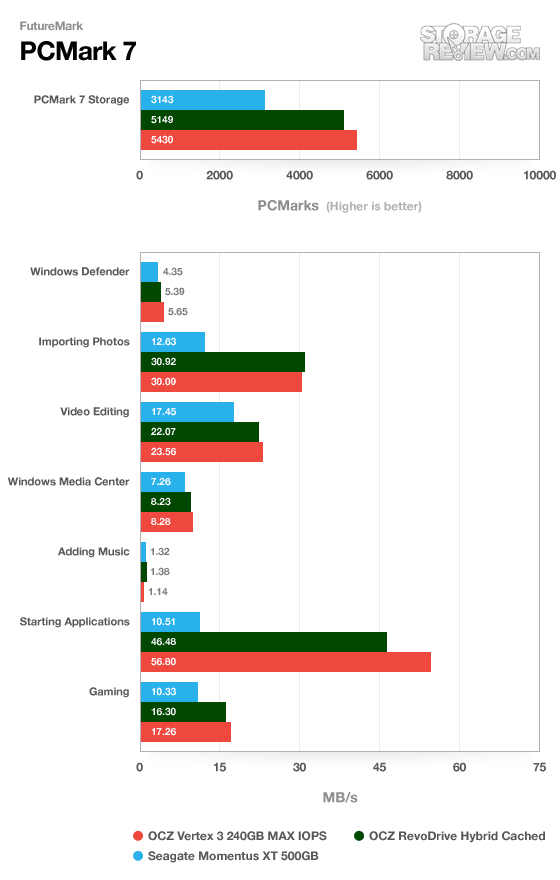
Warranty
Conclusion
Pros
- SSD-like performance in everyday use
- Excellent overall performance
- Dataplex software is excellent
- Easy to install
- Takes up almost two PCI-Express slots
- Time consuming to install OS and applications
- Locked to the included hard drive for now
In the emerging world of hybrid storage solutions, the OCZ RevoDrive Hybrid is truly unique – there’s nothing on the market quite like this offering. The Hybrid delivers near industry-leading SSD speeds across a 1TB 2.5" hard drive – consider the main objective of an SSD cache not only accomplished, but completed with style and panache thanks to innovative product design from OCZ and the creative Dataplex software.
